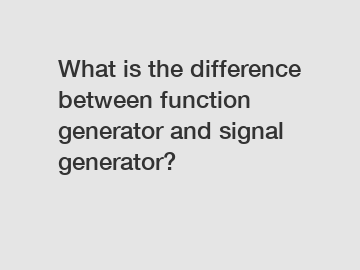What is the difference between function generator and signal generator?
What is the difference between function generator and signal generator?
When it comes to electronic testing and measurement, there are various tools and devices available to generate signals for analytical purposes. Two such commonly used devices are function generators and signal generators. While both generate electrical waveforms, there are some key differences between the two. In this article, we will explore these differences to help you understand which device is better suited for your specific needs.
Function Generator: Understanding the Basics.

A function generator is a versatile device that is primarily used in electronic laboratories and research facilities. Its main function is to generate repetitive waveforms, such as sine waves, square waves, triangle waves, and sawtooth waves. These waveforms can be customized according to specific parameters like amplitude, frequency, and offset, allowing precise control over the output. Function generators are particularly useful for simulating various electrical signals, testing the functionality of circuits, and designing electronic equipment.
Signal Generator: A Detailed Insight.
A signal generator, on the other hand, is a broader term that encompasses various devices used to create a range of signals. Unlike function generators, signal generators are not limited to creating repetitive waveforms only. They can produce a wide spectrum of signals, including radio frequency (RF) and microwave signals, digital signals, audio signals, and more. Signal generators are commonly used in industries such as telecommunications, aerospace, and defense, where the need for different types of signal outputs is crucial.
Frequency Range and Accuracy.
One of the major differences between function generators and signal generators lies in their frequency range and accuracy. Function generators typically have a lower frequency range, usually up to a few megahertz, and are accurate within a certain tolerance. Signal generators, on the other hand, can generate signals across a broader frequency spectrum, ranging from a few kilohertz to several gigahertz, depending on the model. Moreover, signal generators often provide higher accuracy in signal generation, making them more suitable for precise and demanding applications.
Advanced Features and Modulation Capability.
Signal generators also offer advanced features and modulation capabilities that are usually not found in function generators. These features enable the generation of complex signals with specific parameters such as amplitude modulation (AM), frequency modulation (FM), phase modulation (PM), and pulse modulation (PWM). The ability to modulate signals is particularly important in industries like telecommunications and radar, where signals need to be accurately manipulated for data transmission and reception purposes.
Price and Portability Considerations.
In terms of price, function generators are generally more affordable compared to signal generators, primarily due to the difference in frequency range and advanced features. Function generators are suitable for basic testing and educational purposes, where the generation of simple waveforms is sufficient. On the other hand, signal generators tend to be more costly due to their wider frequency range and extensive modulation capabilities. Signal generators are often used in professional settings where complex signals are required for accurate and sophisticated testing.
Conclusion.
In conclusion, while both function generators and signal generators serve the purpose of producing electrical signals, their differences lie in the frequency range, accuracy, modulation capabilities, and price. If you require precise control over repetitive waveforms for circuit testing or equipment design, a function generator would be the ideal choice. However, if your needs involve a broader range of signals, modulation capabilities, and higher accuracy, a signal generator would be more suitable.
If you have any further questions or would like assistance in choosing the right generator for your specific needs, please feel free to contact us. We are here to help you make an informed decision and provide the solutions you require.
For more information, please visit Cheap Signal Generator, Power Quality Analyzer, Oscilloscope With Function Generator.


